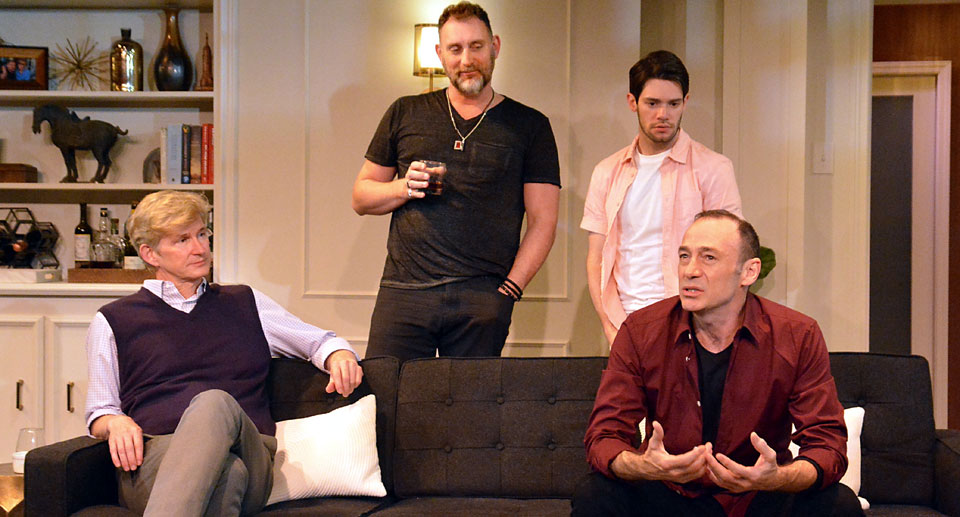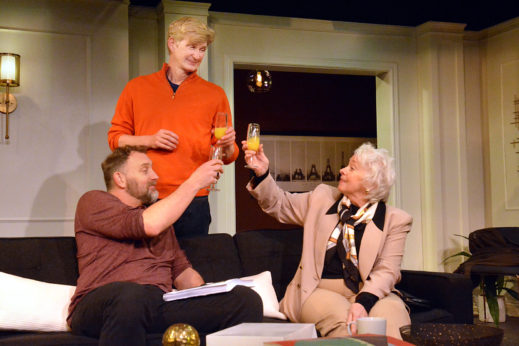
LOS ANGELES— Michael McKeever’s insistently moving play Daniel’s Husband, which premiered in Florida in 2015 before going on to successful off-Broadway runs in New York City in 2017 and again in 2018, as well as a 2017 San Francisco production, has landed in L.A. It’s about the necessity of marriage (and not just of the same-gender variety) in a society such as ours, litigious and property-conscious as we are. I was one of those at the end of those 90 minutes (no intermission) proud to give it a much deserved standing ovation (seen May 4).
I’ll have some critical things to say about the play, but first a few thoughts on where I am coming from.
For five years, as a deputy commissioner of civil marriages, I married couples in the old Beverly Hills courthouse. I’d go in twice a month, on average, for a morning, and over the course of three hours, at 15-minute intervals, I’d marry 12 couples—sometimes one or two more or less depending on no-shows or walk-ins. I started in 2014, after same-gender marriage returned to California, as my way of helping to move history along. By the Supreme Court’s 5-4 decision in June 2015, such marriages became legal throughout the land.
In five years I married about 1500 couples. Generally, in the course of a morning, I’d have at least one or two same-gender couples.
I had just a few minutes with each couple, but occasionally we had a little time to chat. There was one gay couple who had been together 24 years, so I asked them, Why get married now? And their answer, almost in unison, surprised me: “Our financial adviser told us to.”
Another couple had been an item for 15 years. I mused, Then I suppose today isn’t just about the birds and the flowers. “Oh, no,” one of the grooms said, “we’ve been living the birds and flowers for 15 years. Today’s about the healthcare.”
After a time I refrained from asking why they were getting married. I had heard—or guessed—enough stories to know that their reasons were legion, many for love, and some of them involving jobs and visas, residency and citizenship, and in the end, not my business.
But not all LGBTQ people buy into marriage, nor are they necessarily all radical iconoclasts either. A June 4, 2001, cartoon in The New Yorker by William Haefeli, long before marriage was legal anywhere, depicts two middle-class men on a sofa, reading the paper, one of them petting the dog, with a pot of ivy spilling over the bookcase by the window. The other is talking with a friend on the phone, riffing on the expression that had lately become current among activists, matter-of-factly saying, “We’re not doing anything for Gay Pride this year. We’re here, we’re queer, we’re used to it.”
This year is the 50th anniversary of the Stonewall Rebellion that has come to symbolize the official launch of the modern LGBTQ movement. Reports from New York indicate that there will be the official Gay Pride parade for this auspicious occasion, studded with corporate sponsors—you know, banks, airlines, high-tech companies—to show how far we’ve come, baby (remember the Virginia Slims addictive nicotine delivery system ads directed at women?).
And there will also be a alternative “Reclaim Pride” parade to protest the bourgeoisification of an inherently radical, transformative liberation movement, restoring the original countercultural impulse—for many, an anti-capitalist one that still aims to include the poor, the homeless, the communities of color, the trans, the sex workers, the immigrants, etc. The Reclaim folks pointedly and publicly do not want to assimilate and disappear into the banality of normalcy we now see on countless TV sitcoms that generously “include” us—or certain versions of “us.” They envision how far we have yet to go.
So as any local Marxist will tell you, it’s all dialectical. Progress, acceptance, tolerance, yes, if you “get used to” class divisions, racism, sexism and so on which continue to be reflected within the dominant LGBTQ narrative in which marriage and military service have become the measuring sticks for the greatest of all goods.
I love the Fountain Theatre. In recent years it has offered the L.A. public some trenchant works that address critical social justice concerns head-on. To name just a few that we have covered: Citizen: An American Lyric, Dream Catcher, My Mañana Comes, Building the Wall, Runaway Home, Arrival & Departure, Cost of Living, Hype Man, and we’re happy to give those plays another shout-out.
In Daniel’s Husband we confront another hot-button issue that while it centers a same-gender couple, could equally apply to anyone. Must love and commitment necessarily be sealed with a marriage certificate? That is the conundrum at the heart of the play.
In the depressing days of the AIDS epidemic, when many victims of the disease were not even out to their families, care for patients often fell not to their lovers and partners but to relatives from whom they had long distanced themselves for their own survival and peace of mind, but who had the legal authority to intervene and impose. After a person died, family members were often known to swoop in and scoop up anything and everything of value in the house, even it had been the joint property of the gay couple, leaving the surviving partner not only bereft of his lover but of the comforts of the home they had built and occupied together.
Mitchell Howard (Tim Cummings) and Daniel Bixby (Bill Brochtrup) are such a couple, though AIDS is not involved, rather another catastrophic event that affects their lives. The one fly in the otherwise soothing ointment of their harmonious and mutually adoring relationship is that Daniel has from the start known that he wants the societal blessing of marriage “just like everyone else,” and Mitchell just as passionately does not (see Reclaim Pride above). The rubber will hit the road at this particular pothole in the pavement. In one of Mitchell’s stemwinders, he rants:
“The entire concept of marriage, I find outdated, musty and fundamentally wrong. An antiquated contract based more on financial and communal gain than the result of any true emotional connection. An archaic institution—forged in that crucible of all things evil: religion—that over the years, has been distorted into some putti-infested concept created by Madison Avenue for the sole purpose of making money. Oh, don’t get me wrong. I’m not negating your right to get married. In fact, I’d fight to the death for your right, or any gay person’s right, to get married. If that’s what you want. But that doesn’t mean that I have to want it myself.”
Into the mix are Mitchell’s literary agent Barry Dylon (Ed F. Martin), a middle-aged gent with a thing for younger lovers such as Trip (Jose Fernando), who supports himself as an in-home healthcare worker. And then there’s Daniel’s mother Lydia Bixby (Jenny O’Hara), who periodically descends on the couple for a week’s visit from Hell, marked by constant badmouthing of her late husband and Daniel’s father, obnoxious egotism and self-serving slights and digs.
Director Simon Levy has the good fortune of working with the two lead actors who also appeared in the Fountain’s 2013 award-winning production of The Normal Heart, which he also directed. McKeever’s dialogue is crisp and timely, campy and humorous too, revelatory of the comfortable lifestyle two accomplished professionals, an architect and a writer, have created for themselves. Levy has cast the play perfectly and organized the characters’ interrelationships most convincingly.
“When I first read Daniel’s Husband, I fell in love with the love story and was deeply moved by it,” says Levy. “One of the central questions the play asks is, ‘How far will you go to fight for the one you love?’ The characters wrestle with what it means to be committed to someone, to be ‘married’—and what’s legally and morally lost if we don’t tie the knot. McKeever’s play may be about gay marriage, but it’s a universal story that reminds us to grab those we love and hold them close. Love really is precious; and when we find someone we truly love, we should fight for them with everything we have.”
Audiences have responded warmly to the way Mitchell and Daniel’s lives unfold, and rightfully so. But here are my questions: If marriage was not going to be for them, owing to Mitchell’s obstinacy on the subject (on which he is demonstrably eloquent to any and all within hearing range), why couldn’t they have created other legal documents, such as wills, power of attorney, power of healthcare decisions, as many other couples used to and still do to protect themselves? So maybe it’s not entirely about marriage as such but about formalizing commitment that scares them off.

Another issue that I have with the play is that though a lot happens, mostly to the main characters, they remain—I don’t want to say stock characters, but static characters. Ardent as the playwright is to deliver his polemical warning that marriage is an absolute necessity (and to show how Mitchell has behaved foolishly), he is more preoccupied with the didacticism of his lesson than with the growth, changes, and developments in his characters that make a play interesting. Everyone plays their part out just as you would expect, and as a result, no one in it, and no one in the audience experiences a sense of catharsis. The characters are hardly different at the end from what they were at the beginning, despite the enormous upheaval in their lives.
What we are left with is a PSA for marriage on practical, if not on romantic or moral grounds. Not that I don’t agree with that message, I do, I do, but that can’t be all a play is about. It’s basically a highly sophisticated piece of agitprop, a form that definitely has its place in the world, but is not emotionally complete. Nevertheless, the play is so well acted, and the theme is so important, that it does deserve to be seen.
The creative team includes set and props designer DeAnne Millais, lighting designer Jennifer Edwards, sound designer Peter Bayne, and costume designer Michael Mullen.
In a couple of weeks I’ll be entering into a (same-gender) marriage myself, my first. Personally, I didn’t need the polemic—in fact, I could have added a point or two, like about the surviving partner being entitled to the greater of their Social Security benefits, and not paying inheritance taxes.
I mentioned my forthcoming nuptials recently to a friend I hadn’t seen in some months. He said, “Marriage? I’m old-fashioned: I believe in free love.”
But I know plenty of couples who enjoy the legal benefits of marriage while conducting their relationship as freely as they see fit. The contradiction is a false one.
Daniel’s Husband runs through June 23, with performances on Fri. at 8 pm, Sat. at 2 and 8 pm, Sun. at 2 pm, and Mon. at 8 pm. Pay-What-You-Want seating is available every Mon. night in addition to regular seating (subject to availability). The Fountain Theatre is located at 5060 Fountain Ave. (at Normandie) in Los Angeles. Secure, on-site parking is available for $5. For reservations and information, call (323) 663-1525 or go to www.FountainTheatre.com.












Comments